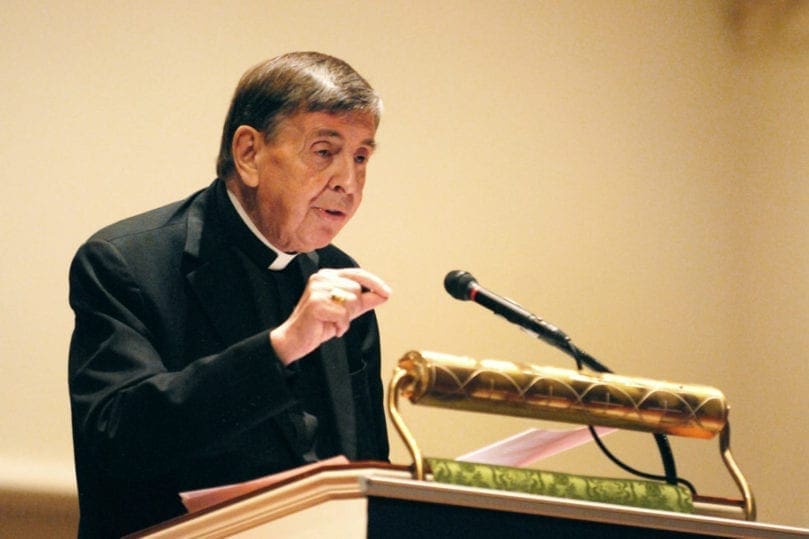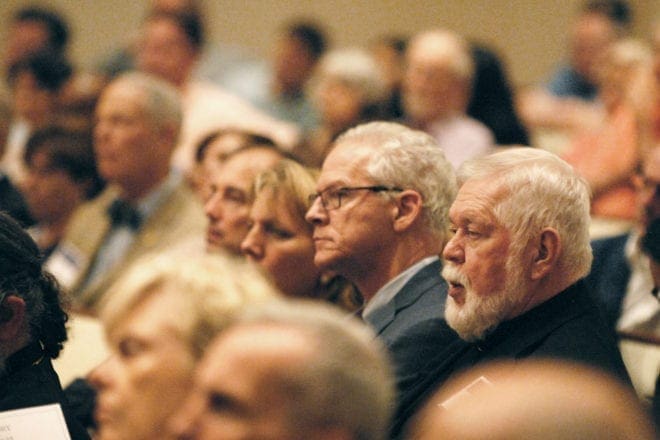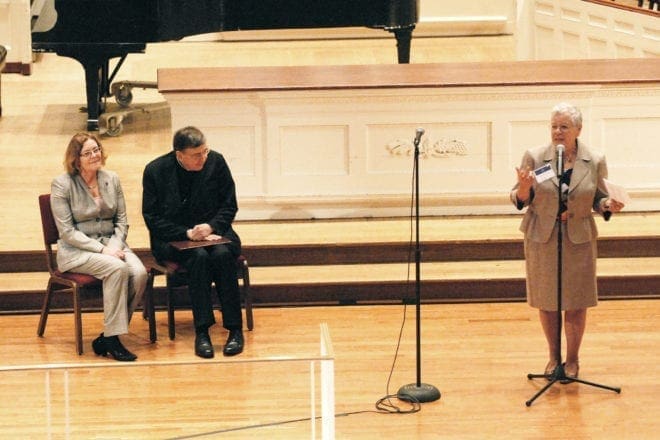 PHOTO BY LAURA MOON
PHOTO BY LAURA MOONAtlanta
Cardinal delivers strong message on suffering of Christians worldwide
By ANDREW NELSON, Staff Writer | Published October 4, 2018
ATLANTA—The clergy sex abuse crisis rocking the church and its resolution “must be placed at the top of the agenda of the church” said a Vatican leader during a visit to Emory University on Sept. 18.
In his hourlong lecture at the university, Cardinal Kurt Koch, the president of the Pontifical Council for Promoting Christian Unity, gave a sweeping history of the ecumenical movement, from the modern Catholic origin at the Second Vatican Council with the decree on ecumenism, “Unitatis Redintegratio,” to today’s “strong headwind” on questions of the meaning of church unity.
But the cardinal did not ignore the crisis of sexual abuse. He focused his opening remarks on the crisis, drawing on his 15 years as bishop of the Diocese of Basel in Switzerland. Cardinal Koch said a zero-tolerance policy against abusers, along with further efforts to strengthen prevention efforts, are necessary steps to help prevent abuse and care for survivors.

Msgr. Henry Gracz, pastor of the Shrine of the Immaculate Conception, Atlanta, listens intently with others in attendance as Vatican leader Cardinal Kurt Koch delivers a lecture on Christian unity at Glenn Memorial Auditorium at Emory. Photo by Laura Moon
Cardinal Koch said the scrutiny facing the church and its leaders “overshadows all other activities” until the the situation is resolved.
The “highest priority must be given to victims,” he said. “We owe them as victims of serious crimes our concern and care. We must listen to them so they have a space where they can speak about their suffering,” he said.
Global persecution
The Aquinas Center at Candler School of Theology presented Cardinal Koch’s talk in one of the fast growing regions for Catholics in the United States, with roughly a million believers in the archdiocese. However, Catholics make up less than 10 percent of adults in Georgia, with the largest number identifying as evangelical Christians, according to the Pew Research Center.
Speaking in Glenn Memorial Auditorium at Emory, the cardinal said the global persecution of Christians is raising profound questions about ecumenism, as believers are harassed and killed. Cardinal Koch called the situation “ecumenism of the martyrs.”
“In the ecumenism of the martyrs we can perceive the most convincing sign of ecumenism today which will ever confront us, with the disquieting question posed by Pope Francis, ‘If the enemy unites in death, who are we to be divided in life?’”
Christians targeted for their faith around the world are shaping the urgency of dialogue. A report from the Catholic organization Aid to the Church in Need stated, “In almost all the countries reviewed, the situation for Christians has declined since 2015 as a result of violence and oppression.”
And a report from Pew Research Center identified that Christians were harrassed in a rising numbers of countries. In 2015, the number was 128 countries, up from 96 in 2009.
“Today, all churches and ecclesial communities have their martyrs. Today, Christians are not persecuted because they are Orthodox or Catholic … but because they are Christians,” said the cardinal.
It has been an important issue to popes highlighted by St. John Paul II, who looked for a positive sign despite the tragic situation, he said.
“The blood the martyrs shed for Christ today does not divide us Christians but instead unites us … In the ecumenism of the martyrs, we encounter a beautiful promise,” said Cardinal Koch. “We can be convinced that we Christians have already become one in the blood of the martyrs and that the suffering of so many Christians establishes unity that will prove to be stronger than the differences that still divide Christian churches.”
Meeting with students
Cardinal Koch also gave the opening lecture of the Candler School of Theology’s Catholic Studies Program on the following day.
He spoke to hundreds of faculty, students and others interested in the bridge-building between the Vatican and other Christian churches and the Jewish community.
During his visit, Cardinal Koch celebrated Mass with students at Cristo Rey Atlanta Jesuit High School, visited with local leaders of the Jewish community and the Orthodox Church.
About his visit to the high school, the cardinal in an interview called it “a beautiful sign” to see many non-Catholic students at Mass come forward for a blessing. Some 48 percent of the student body is non-Catholic.
The role of Catholic education serving non-Catholics is “nourishment” for his work, he said. And it reveals the necessary “ecumenism of life and ecumenism of love,” he said. Christians must meet to “get together, pray together and collaborate together,” added the cardinal.
Deacon Bill Garrett, the school’s president, said the cardinal engaged with the students, greeting each one after Mass. Deacon Garrett, who assisted at Mass, said the cardinal was interested in the students, the school and impressed that Atlanta companies would be eager to make a difference in the lives of the students. Education at Cristo Rey Atlanta occurs both in the classroom and in offices throughout the city. Through the school’s unique Corporate Work Study Program, every student works five full days a month to fund the majority of their education and gain professional experience.

Dominican Sister Mary Priniski, Ph.D., right, welcomes guests to Cardinal Kurt Koch’s lecture Sept. 18. She is the interim director of the Aquinas Center at Candler School of Theology. Shown left is Emory University President Claire Sterk, Ph.D., sitting next to Cardinal Koch. Photo by Laura Moon
Adrian Dominican Sister Mary Priniski, the interim director of the Aquinas Center, said the visit launched the center’s yearlong focus on ecumenism and interfaith dialogue. It is a key area to study because people outside the Christian faith see the divisions among the churches, which in turn weakens the message of the Gospel, she said.
And it is a lesson not only for issues of faith, but society too, said Sister Mary.
“We are living in a very polarized society in the public sphere. It’s another arena we have to learn to talk to each other, and listen and learn,” she said.
The new Catholic Studies Program at the historically Methodist university will draw in Catholics and others interested in church ministry and research. It is headed by Antonio Alonso, Ph.D., whose specialty is theology and culture.
Alonso said the cardinal’s lecture marked the official launch of the program. His message of Christian unity was especially relevant for faculty and staff, where there is constant ecumenical conversation, he said.
“We believe that exploring the Catholic tradition alongside students and faculty from other Christian denominations uniquely equips Catholic lay ecclesial ministers for service and research in the ecumenical reality of the 21st century,” he said in an email.